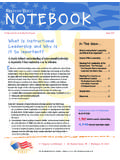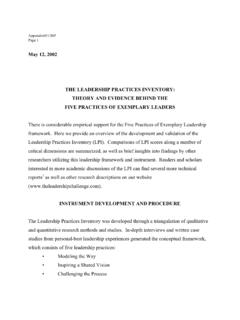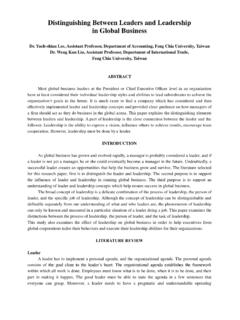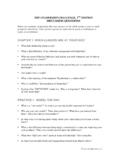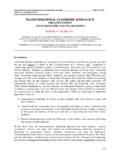Transcription of Unlocking the mask: A look at the process by which ...
1 ReviewUnlocking the mask: A look at the process by which authenticleaders impact follower attitudes and behaviorsBruce J. Avolio*, William L. Gardner, Fred O. Walumbwa,Fred Luthans, Douglas R. MayGallup Leadership Institute, Department of Management, College of Business of Administration,University of Nebraska-Lincoln, United StatesAbstractThe conceptual and empirical links between authentic leadership and follower attitudes , behaviors, andperformance outcomes have not been fully developed. Although we have a number of articles developing thetheory of authentic leadership and testing propositions that will appear in a forthcoming special issue ofTheLeadership Quarterly(Vol.)
2 16, Issue 3, 2005),the focus of this article is to provide some of the initial foundationwork for the broader theoretical framework of how authentic leaders influence follower attitudes , behaviors, andperformance. Here, we draw from positive organizational behavior, trust, hope, emotion, identification, andidentity theories to describe the processes by which authentic leaders exert their influence on followers attitudesand behaviors. Research propositions based on the proposed theoretical model and implications for future theorybuilding and research are Elsevier Inc. All rights : authentic leadership; Positive organizational behavior; Identity theories; follower attitudes and behaviorsContents1.
3 8022. authentic authentic leadership and followers Personal Social 8071048-9843/$ - see front matterD2004 Elsevier Inc. All rights * Corresponding author. Tel.: +1 402 472 6380; fax: +1 402 472 ( Avolio).The Leadership Quarterly 15 (2004) 801 authentic leadership and authentic leadership and trust in the authentic leadership and positive authentic leadership and Summary of the 8293. Conclusions and future research 8501. IntroductionThe topic of authentic leadership is generating increased interest in both practitioner (George, 2003)and academic literatures (Avolio, Luthans, & Walumbwa, 2004; Gardner & Schermerhorn, 2004;Luthans & Avolio, 2003; May, Chan, Hodges, & Avolio, 2003).
4 We speculate that the reason whypractitioners and scholars are interested in authentic leadership is because the influence of authenticleaders extends well beyond bottom-line success; such leaders have a role to play in the greater societyby tackling public policy issues and addressing organizational and societal problems (George, 2003). AsAvolio et al. (2004)noted,bthe unique stressors facing organizations throughout society today call for anew leadership approach aimed at restoring basic confidence, hope, optimism, resiliency, andmeaningfulnessQ(p. 3). SenatorMcCain and Salter (2004)summarized the importance of beingauthentic, asbit is not enough to be honest and just and demand that we be treated honestly and justly byothers.
5 We must learn to love honesty and justice for themselves, not just for their effect on personalcircumstances, but for their effect on the world, on the whole of human experience, on the progress ofhumanity in which we have played our partQ(pp. 106 107).Our purpose here is to develop the beginnings of a theoretical framework as a basis for guiding futureresearch on the underlying mechanisms that allow authentic leaders to exert their influence on followers attitudes , behaviors and performance. Future theoretical and empirical work that will appear in aforthcoming special issue ofThe Leadership Quarterly(Vol. 16, Issue 3, 2005) will expand the focus ofthe current article to include topics such as what constitutes authentic followership, authenticfollowership development, authentic leadership development and authentic leader and followerrelationships.
6 Greater attention will also be paid in the forthcoming series of articles in the specialissue to differentiating a model of authentic leadership from other leadership frameworks such astransformational, servant and spiritual construct of authenticity is captured well by the injunctions of ancient Greek philosophers tobKnow thyselfQandbTo thine own self be trueQ(Harter, 2002). As these phrases suggest, the essence ofauthenticity is to know, accept, and remain true to one s self. Rather than conceiving of authenticity as aneither/or construct, it is best to recognize that authenticity exists on a continuum and that the more peopleremain true to their core values, identities, preferences and emotions, the more authentic they become(Erickson, 1995; Heidegger, 1962).
7 We conceive of authentic leaders as persons who have achieved high levels of authenticity in that theyknow who they are, what they believe and value, and they act upon those values and beliefs whiletransparently interacting with et al. (2004)defined authentic leaders asbthose individualswho are deeply aware of how they think and behave and are perceived by others as being aware of Avolio et al. / The Leadership Quarterly 15 (2004) 801 823802 Fig. 1. Proposed framework linking authentic leadership to followers attitudes and Avolio et al. / The Leadership Quarterly 15 (2004) 801 823803own and others values/moral perspective, knowledge, and strengths; aware of the context in which theyoperate; and who are confident, hopeful, optimistic, resilient, and high on moral characterQ(p.)
8 4). Wesuggest that authentic leaders are able to enhance the engagement, motivation, commitment, satisfaction,and involvement required from followers to constantly improve their work and performance outcomesthrough the creation of personal identification with the follower and social identification with theorganization (Kark & Shamir, 2002).Our proposed model shown inFig. 1recognizes that although authentic leadership is important, it isnot sufficient to achieve desired goals. As shown, there is a process linking authentic leadership tofollowers attitudes and behaviors. Thus, our model contributes not only to a better understanding of theprocesses through which authentic leadership operates by highlighting how such leaders may influencefollowers attitudes and behaviors, but also how intervening variables, such as hope, trust, positiveemotions, and optimism, can be enhanced.
9 This process seems important to address both theoreticallyand practically, because it provides a potential foundation and point of departure for authentic leadershipdevelopment (Day, 2000; Day & O Connor, 2003; Luthans & Avolio, 2003). All of those constructsrepresent states that can be positively developed, and what we consider to be essential linkages in theauthentic leadership development second contribution of our proposed model is that it recognizes for the first time the possible role thatpositive emotionsandtrust may play in the authentic leadership process . As noted byLord and Brown(2004),bprevious leadership theories have generally focused on more cognitive , the theoryand measurement of affective processes has been ignored by leadership researchers or, alternatively, hasbeen approached from a cognitive framework that emphasizes attitudes rather than basic emotionalprocessesQ(pp.)
10 122 123). Recently, several researchers ( ,Ashkanasy & Tse, 2000; Brief & Weiss,2002; Kanfer & Klimoski, 2002) have pointed out the importance of emotions in the leadership process . Aspecial issue ofThe Leadership Quarterly(Vol. 13, Issue 5, 2002) on the subject of emotions andleadership attests to the important role of emotions in leadership effectiveness. We respond to this call byincluding positive emotions as a critical component in the authentic leadership , trust in leadership has been identified as a crucial element in the effectiveness of leaders (Bass, 1990). In a recent meta-analysis byDirks and Ferrin (2002), trust in leadership was found to beassociated with a variety of important organizational outcomes, including belief in information,commitment, organizational citizenship behavior, satisfaction with leaders , and intention to , in their concluding remarks, Dirks and Ferrin suggested that there is a need to examine thebehavioral cues that followers use to draw conclusions about the character of the leader or, put simply,how leaders might develop trust in followers.



